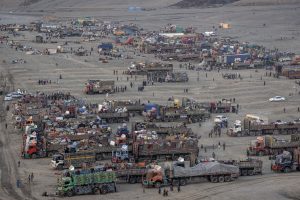For decades, the Pushtun Ahmadzai Wazir tribe living on both sides of the Durand Line could wave their national identity documents to the guards to cross the Torkham border, the main point of transit for travelers and goods between Pakistan and landlocked Afghanistan. That is no longer possible, with Islamabad on January 13 reimposing the “one document regime” policy, which it had suspended not long after its unveiling in 2023.
Under the policy, Afghan civilians, including drivers and their helpers crossing over through all transit routes with Afghanistan must have passports with a valid Pakistani visa. Very few fulfil these requirements.
As officials from both countries engage in negotiations to end the current impasse, the border has been shut for trade, with hundreds of vegetables and fruit-laden trucks from both countries stranded with perishable supplies that are likely to rot in a few days. This is Islamabad’s most recent move to arm-twist its fickle ally.
The Taliban’s capture of power in August 2021 was celebrated in Pakistan as the realization of its policy of regaining strategic depth vis-a vis India. However, in the succeeding months, these hopes were belied as the Islamic Emirate’s policy on the Durand Line and especially on the haven it provides to the Tehreek-e-Taliban Pakistan (TTP) ran completely contrary to the government in Islamabad. The Taliban government opposed Pakistan fencing the contested Durand Line and repeatedly denied sheltering the TTP. On the contrary, it advised Islamabad to hold peace parleys with the TTP so that the group could be persuaded to give up violence targeting the Pakistani state.
The Taliban’s volte-face is a bitter pill Islamabad has found hard to swallow. In the last few months Pakistan’s caretaker government, appointed ahead of the national polls, has tried to use multiple tactics to make the Taliban fall in line, albeit without success.
It started with the then-Pakistani Prime Minister Shehbaz Sharif issuing public statements about the Taliban turning Afghanistan into a haven for terrorist groups. The Taliban hit back with denials and asked for an apology. Incidentally, in September 2023, the Torkham border crossing had been shut for eight days following clashes between Taliban and Pakistani soldiers.
In October 2023, much to the anger and opposition of the Taliban, thousands of “undocumented illegal immigrants” settled in Pakistani cities were forced to go back to Afghanistan. The deported, among a targeted population of the 1.7 million “undocumented Afghans” in Pakistan, included many who had valid papers to stay in Pakistan and also those who were born in Pakistan to parents who had made Pakistan their home. As I argued in an earlier piece, the Taliban and international aid agencies have found it immensely difficult to assist these immigrants and returnees.
In November 2023, border trade was suspended after Pakistan tried imposing its new visa rule. Normalcy was restored after officials reached an agreement to grant the Afghan drivers a two-week extension.
It is rather strange for Pakistan’s caretaker government, tasked merely to oversee the elections slated now for February 8, to initiate such important policy decisions. It wouldn’t have been possible without the Pakistani military pulling the strings from behind, an act that this immensely powerful entity has indulged in without interruption since the country’s formation in 1947.
The fact that Islamabad is not trying to cut ties with the Taliban and is merely attempting to coerce it into a course correction was evident in the trip of Maulana Fazlur Rahman, leader of the Jamiat Ulema-e Islam Pakistan (JUI) political party, to Kabul on January 7. Although the Pakistani media highlighted that the trip was at the request of the Taliban, it wouldn’t have been possible without a nod from the Pakistan military. Rahman met with the Taliban’s Acting Prime Minister Mullah Akhund and Foreign Minister Amir Khan Muttaqi. Although the JUI said that the visit was to “remove the misunderstanding between the two countries,” the Torkham border impasse shows that little came out of the visit.
According to the Pakistan-Afghanistan Joint Chamber of Commerce, imbalanced trade between the two countries amounted to $2.5 billion in 2010. In 2022-23, it was just above $1.8 billion. Landlocked Afghanistan heavily relies on Pakistani goods and foreign items sourced through the Karachi port. This gives Islamabad huge leverage to pressure the Taliban, although Pakistan also cites the loss of hundreds of millions of dollars each year by allowing Afghan-bound goods to enter the country duty-free. Historically, Pakistan has used border closures as a pressure tactic on the regimes in Kabul. During my field visits to Afghanistan, particularly around the Torkham border area in Nangarhar province, it was evident that the Afghans who could cross over the border were wary and resentful of Pakistan’s border closures and the flushing of cheap goods into Afghanistan.
Pakistan is leveraging trade issues as a tool of pressure to secure its political interests. It also intends to put an end to the free movement of tribes in the region to formalize the Durand Line. The Taliban authorities have reportedly returned the favor in denying Pakistani trucks carrying cement, tractors, other agricultural tools, vegetables, oranges, and miscellaneous items, from entering Afghanistan through Torkham as well as the Kharlachi border crossing in Kurram. Like previous occasions, the impasse might end in a few days only to recur in the future. However, the acrimony between the two countries is likely to persist, thereby protracting the sense of agony in Islamabad that the Taliban – a former ally in which it invested for decades – has decided to break free.

































